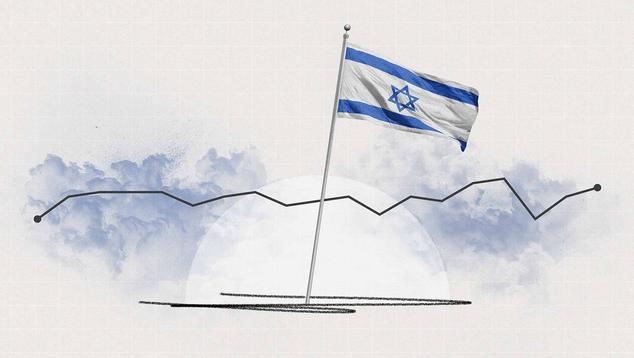This article is the second in a series about life in Israel and in the West Bank and East Jerusalem almost two years after the Israel-Hamas war began. Read about attitudes toward peace and the two-state solution and Palestinian attitudes in the West Bank and East Jerusalem.
LONDON -- Israelis’ sense of wellbeing has returned to a level last seen before the Israel-Hamas war started nearly two years ago, even as the war remains the most important problem on their minds. Israelis surveyed in July and August now rate their lives at 7.5 out of 10, nearly a full point higher than the 6.8 in late 2023, shortly after the Oct. 7 attacks.
The decline in Israelis’ life evaluations between 2022 and 2023 was the largest year-to-year drop Gallup recorded for any country over the same period.
Daily Emotions Return to Pre-Oct. 7 Levels
Gallup’s survey in the weeks just after Oct. 7, 2023 (conducted between Oct. 17-Dec. 2) found sharp increases in Israelis’ negative emotions. At least half of Israeli adults reported experiencing a lot of worry (67%), stress (62%) or sadness (51%) the previous day, among the highest levels in the world at the time, and 36% experienced a lot of anger. The sharp increases in negative emotions between 2022 and 2023 were the largest annual increase in these measures anywhere in the world in nearly two decades of Gallup tracking.
After starting their decline in 2024, these emotions have now returned to pre-2023 levels. One-third of Israelis (33%) report experiencing worry, while 25% report stress, 18% sadness and 15% anger.
The Negative Experience Index averages the “yes” responses to these four negative emotions along with daily experiences of physical pain; higher scores represent higher levels of negative experiences. No other country saw a larger surge in negative emotions than Israel in 2023, and no other country has seen them fall so sharply within two years.
The speed of Israel’s recovery contrasts with patterns in other countries where large spikes in negative experiences remained elevated after major shocks and instability. In Madagascar in 2017 (instability and humanitarian crisis), Cambodia in 2010 (border conflict, political repression), Syria in 2011 (civil war) and Lebanon in 2019 (economic crisis), jumps in negative emotions persisted long after the initial events.
Although Israelis’ levels of daily stress and sadness have eased since Oct. 7, the conflict remains central to the nation’s public consciousness. When asked in an open-ended question to identify the most important problem facing their country, 71% of Israelis mention issues related to law and order, such as war, conflict and violence. By contrast, fewer than one in 10 cite issues related to the economy (9%) or government performance (6%).
Views Toward Washington Rebound
Public opinion of U.S. leadership in Israel has also shifted considerably since 2023. The United States is Israel’s closest ally and provides the country with significant military and diplomatic support.
In the weeks immediately after the 2023 Hamas attack, Israelis’ approval of U.S. leadership reached a record high of 81%. By 2024, approval declined 18 points to 63% — on par with 2022 (65%) — amid visible tensions between the Israeli government and the Biden administration. No other country saw a bigger decline in U.S. approval than Israel between 2023 and 2024.
In 2025, following President Donald Trump’s return to the White House, Israeli approval of Washington has rebounded to 76%, the second-highest level on record for Israel. This ranks among the highest approval ratings of Washington ever measured among OECD (Organisation for Economic Co-operation and Development) nations, irrespective of which administration has been in office, slightly below approval ratings in Poland in 2022 and Ireland in 2009 (both 80%), and Israel in 2023.
Views Toward Own Leadership Unchanged
While perceptions of U.S. leadership have shifted considerably, Israelis’ views of their own leadership are more stable. In 2025, 44% of Israelis say they approve of their national leadership, and 40% express confidence in their national government. Both figures align with national averages for trends going back to 2007.
Prime Minister Benjamin Netanyahu’s personal approval rating also remains stable at 40%, which is in line with the period since 2023, but somewhat lower than his 2017 high of 52%. While Netanyahu, his government, and wider national leadership continue to retain stable levels of public support, most Israelis have negative views of Israeli leadership generally — and Netanyahu specifically.
Minority Confident in Judiciary
In 2025, 43% of Israelis express confidence in their judicial system and courts, while 48% do not, the first time on record that public opinion has been negative on balance.
In the weeks before Oct. 7, large-scale demonstrations swept across Israel in response to Netanyahu’s plan to overhaul the judiciary and curb the authority of Israel’s Supreme Court. Although the initiative was put on hold after the attacks, public trust in the country’s legal institutions has continued to fall.
Since 2022, confidence in the courts among Netanyahu’s supporters has fallen to 37%, a record low, while confidence among his detractors has held steady at 47%.
For much of Netanyahu’s previous term, which preceded the judiciary overhaul plan, those who approved of his leadership expressed more confidence in the judiciary than those who disapproved.
That pattern shifted in 2019 and 2020, when Netanyahu was indicted on charges of bribery, fraud, and breach of trust. During this period, his detractors reported greater confidence in the judicial system than his supporters. In 2021 and 2022, under Prime Ministers Naftali Bennett and Yair Lapid, supporters of the sitting leaders again showed higher confidence in the courts, before reversing under Netanyahu’s return to office at the end of 2022.
Bottom Line
Nearly two years after the Oct. 7 attacks, questions relating to law and order, such as war, conflict, and violence, dominate all other issues Israelis see as problems in their country. Yet against this backdrop, life evaluations and daily emotional wellbeing have rebounded in 2025, along with approval of Washington coinciding with Trump’s return to the White House. Netanyahu’s base remains stable but short of the majority, while confidence in the judicial system has slid further, driven by his supporters.
Stay up to date with the latest insights by following @Gallup on X and on Instagram.
For complete methodology and specific survey dates, please review Gallup's Country Data Set details. Learn more about how the Gallup World Poll works.




